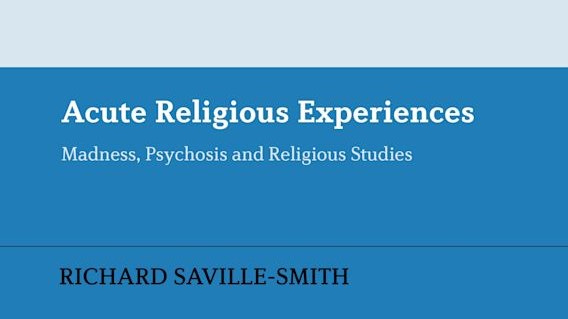Mysterium tremendum fascinans
“How is it possible to persuade a psychiatrist that one is sane when in the midst of an overwhelming and ineffable experience of god?"
For background:
Two excerpts from Richard Saville-Smith’s book Acute Religious Experiences: Madness, Psychosis and Religious Studies:
A)
“But, deep into this book, I do want to write two things about madness as madness, as my madness, for the benefit of any psychiatrists who may stumble across these words:
1. Being mad is, for me, not the aberration, it is the more, the numinous, the Shamanic consciousness, the mystical experience, the reality beyond the model offered by the psychotomimetic/psychedelic experience. Madness is the peak experience. In quantitative terms madness is a small part of my life, in qualitative terms it is the most profound, the most important, the most eye-opening, mind-altering, liberating experience, like a light-bulb moment which can last for pain-filled weeks, too hot, too bright, too harsh. I am not not me when I am mad. I am the same person, living the same life but with the costs and benefits of riding a wave of immediacy over which the only control I seek is to go higher. The reason mad people, like me (I speak for myself, but I know I’m not alone), are forcibly detained is because, in contrast with all other ‘medical’ patients, I am impatient, I don’t want to be helped or cured, I don’t want to be interrupted.
2. Speaking even more personally, when the psychiatric system trips me up and intervenes for the benefit of myself or others, I understand their good intentions. But what they don’t know is that when they lock me up, I make myself sane – in order to escape – and, and this is the key point, in pretending to be sane I become sane. This pretence is exhausting. I adopt routines, but not rigidly, ritually or obsessively – an afternoon nap, an evening bath (they don’t know whether I sleep or bathe). I walk instead of running, I sit where I can be seen, pretending to read a book, as the words bleed down the page, I eat my meals at mealtime and ask the staff to compliment the chef, I play chess by sticking to the rules, I hold my tongue and I do not rise to provocation. These strategies are not some product of autopoesis, although I learned much from my cumulative experiences; my strategic insight came from observing my dad. He went manic annually, with the October gales, and pumped full of antipsychotics…



